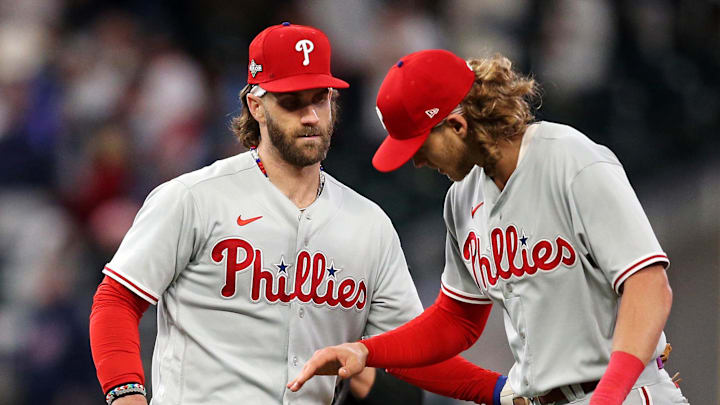Of all the stupid arguments heard these postseason days, the idea that getting a first-round playoff bye somehow constitutes a handicap has to be the stupidest.
Yet it is being made again and again on sports media as the division round of the playoffs proceeds.
Why? Because the Atlanta Braves, Los Angeles Dodgers, Houston Astros and Baltimore Orioles — the four teams who sat out last week while their opponents played through the Wild Card round — are a combined 1-5 entering play Monday.
To hear the complainers, the Texas Rangers, Minnesota Twins, Philadelphia Phillies and Arizona Diamondbacks are somehow advantaged by having risked their postseason futures in a series their current opponents did not have to play, and then by ceding home field advantage for this series.
Wanna know what ballplayers think about that line of logic, if "logic" isn’t too strong a word? Ask anybody on the Miami Marlins, Milwaukee Brewers, Tampa Bay Rays or Toronto Blue Jays.
Here’s the reality that none of the supposed talking head geniuses want to confront. Postseason baseball in its current multi-round iteration is a Vegas crapshoot, pure and simple. Not only does the best team not always win, it would be silly to expect that.
Why MLB postseason baseball is unpredictable
That’s embedded in the nature of baseball. Two reasons, the first being the fact that so much of the game’s outcome is determined by a highly fungible factor: the day’s starting pitcher.
There is a second fundamental reason why postseason series are so unpredictable, that being the relatively even nature of the competitors.
This year the team with baseball’s best record, the Atlanta Braves, won 104 games, an exceptional .642 percentage.
But in the 63 games the Braves played against other postseason teams, their record fell to .603, an .039 percentage point drop. That should not come as a surprise; any team’s record should be worse against quality opponents. But that’s precisely the point; in postseason, there’s nothing but quality opponents ... which is why anything can happen.
History tells us this if we will open stop and listen. The statistical rule of history is that in a major league game between teams of relatively even ability (the definition of a postseason game), the "better" team will win about 55 percent of the time. Superficially, that sounds like a very good thing for the favorites.
In fact in what amounts to a three-round tournament, it’s the opposite; it means there’s a 45 percent chance that the "lesser" team (and we’re not talking about much lesser here) will win. Multiply that out across three rounds of pressure-packed postseason tournament-style ball and the chance of the best team winning the World Series reduces to a fractional 16.7 percent.
That leaves an 83.3 percent that sometime, somewhere, somehow, the rug will be pulled out from under the favorite. The question isn’t whether; it’s more a question of when and how.
We see this same thing happen season after season and somehow never learn from it. In 2022, the Dodgers entered the regular season with 111 victories and got beat in five games by the San Diego Padres in the NLDS.
The Giants won 107 games in 2021 but drew the 106-win Dodgers in the division round and lost in five. In fact, since 2010 (and excluding the 2020 COVID-shortened season), only three teams that brought the best regular season record with them into postseason actually won the World Series. Those three were the 2013 and 2018 Red Sox and the 2016 Cubs.
What might be called the "55 percent rule" happens to work out perfectly across both time and playoff formats if one only takes the time to examine the data. Since 2010 (back when there were only eight postseason teams and everybody played three rounds), there have been 106 such postseason series (including one-game series) contested. Seven of those pitted teams with identical regular-season records. Of the remaining 99, the team with the better record won 54, the team with the worse record won 45.
That’s a .545 winning percentage for the "better" team. Bang!
What’s happening in all these supposed postseason upsets isn’t surprising or alarming. It’s the natural order of things in the multi-layered postseason system used by MLB today.
